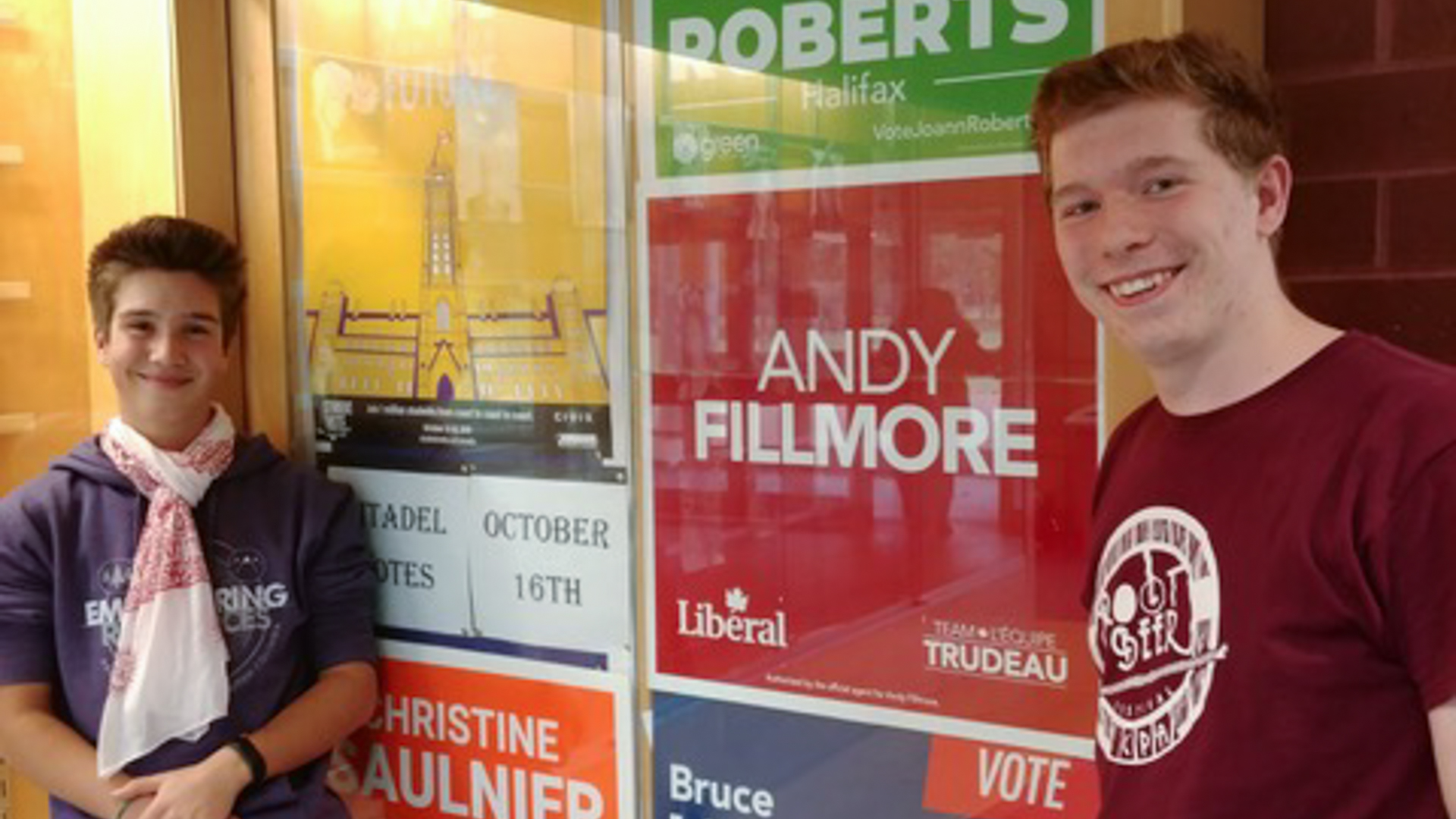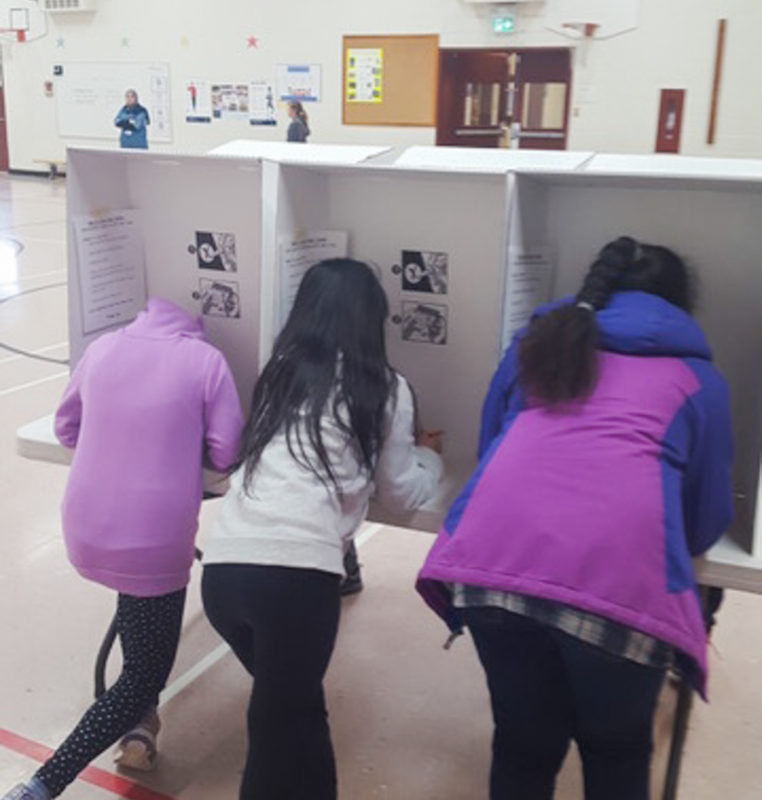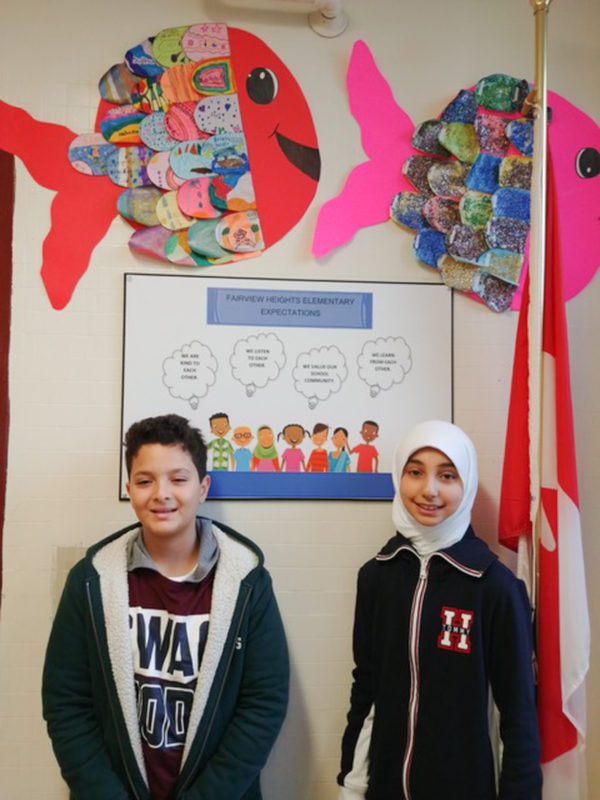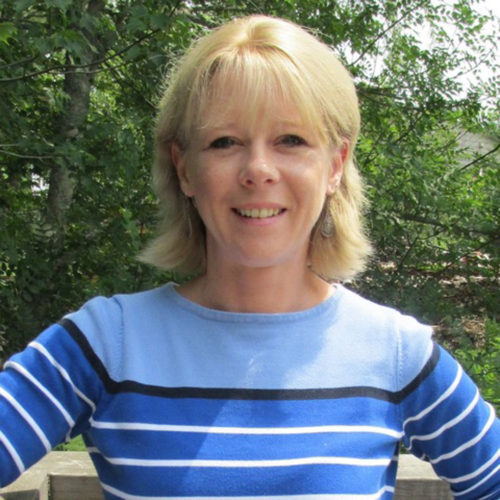Federal election
Young Haligonians ready to talk politics after Student Vote
Elections Canada organizes a mock vote for elementary and high school students

caption
Citadel High School students share their perspectives after casting their vote.Even though they couldn’t legally vote, students at Fairview Heights Elementary School still took part in last month’s election.
Grade 3 to 6 students cast their ballots, along with 1.1 million other elementary and secondary students across Canada, in a mock vote. Known as Student Vote, it’s an initiative organized by Elections Canada and CIVIX, a charity that promotes citizenship among younger Canadians.

caption
Students cast their ballots at Fairview Heights Elementary School.Mac Nada, an 11-year-old Fairview Heights student, said he was excited.
“I felt like I was 18 and I was in the place where they vote. I felt like I was really voting,” he said.
Participating schools received privacy booths, ballots and resources to teach students about party platforms and other important election-related topics.
In the end, Mac’s vote went to the Green Party.
“(The) environment is very important, to keep the earth green and stop polluting, so I thought Elizabeth May had a very good platform,” he said. “It felt good to know that someone actually cares for the environment.”
He felt it also would have been good for women’s rights to see May become prime minister.
Climate change wasn’t the only issue important to Mac. He also highlighted immigration and Canada’s relationship with the U.S. as important topics and favoured the Conservative Party’s approach to them.
His classmate Miriam Mahdi preferred not to say which party she voted for, but found learning about the environment interesting.
“For the Green Party, they’re trying to make the environment a better place,” she said. “Other parties are leaning more towards stopping or continuing things.”

caption
Students participate in a mock vote at Fairview Heights Elementary School.Part of the vote’s impact for her was getting to share the experience with both her parents and other students across the country.
“It’s interesting to know you’re a part of something,” she said. “We get a chance to do what other people are doing and learn about how they vote and what goes on during it. That was exciting.”
The school became involved for the first time this year, after English as an Additional Language teacher Sarah Dalton took a trip to Ottawa last summer.
“Leading into the election it just reminded me how lucky we are to be in a free, social democratic country,” said Dalton. “I realized when I got back, I wanted to communicate some of that excitement for this vote.”
Learning about government is already part of the curriculum for Grade 3 to 6 students. That doesn’t just include the process of electing a prime minister, but also looking at the Senate and how laws are made.
Dalton’s lessons included photos taken during her Ottawa visit to show where each body of government meets and what they do.
“Somebody doesn’t wake up tomorrow and say, ‘Oh, new law’, there’s a whole process where it’s brought forward, it’s tabled, it’s discussed and I get into that as well,” said Dalton. “There’s more to it than just somebody checking a box and instituting a law.”
While primary to Grade 2 students didn’t participate in the vote, Dalton said she had those teachers approach her about material for lesson plans.
Dalton’s students have arrived in Canada from all over the world, including the Philippines, Kosovo, Sudan, Syria, Afghanistan, Albania and Guatemala. Sixty per cent of Fairview Heights students are just learning to speak English. Talking about the country’s government brings forth a number of new lessons beyond how the prime minister is elected or what happens in Parliament.
“It’s more than language learning; they’re learning a culture, and many of them have not come from a free, democratic country,” said Dalton.
The goal is they take home what they’re learning and start a conversation with their parents, as it may have been the parents’ first time participating in a democratic process. While many Canadians may take voting for granted, Dalton said, for others it’s something unfamiliar. The teachers also engaged newcomer parents on election day to try and help ease any nerves. Discussions didn’t include which party the teachers were voting for, but simply when they were heading to the polling station.
“To just let people know that it’s almost an expectation of citizenship to put your vote into action,” said Dalton.

caption
Teacher Sarah Dalton says students get to talk about elections with their parents.At Citadel High School, 650 of 1,500 students participated in Student Vote. Volunteer roles such as poll clerks, deputy returning officers, and chief electoral officers were also assigned to students.
Ivan Andreou, a Grade 12 student interested in a career in politics or government, was enthusiastic about taking part.
“It’s something that everyone should be involved with,” said the 17-year-old.
“You see all these people making empty promises and have given politics and politicians a bad reputation. My mindset is, I have to go in there and stop that. Politicians should be someone you can trust, you put your faith in and they do good things with it.”
What impressed him about the Student Vote experience was how official it was. Voters had to show their student ID, then go behind the privacy booth to cast their ballot. They also got I Voted stickers afterwards.
Nick Leblanc, a fellow Grade 12 student, said the “real life experience” felt empowering.
“Whoever you are, you can have your voice heard,” he said.
Nick had to watch the leader debates for homework and learn to identify misinformation. He also made a point of learning about issues he wasn’t well informed on and may not have typically sought out, like the economy, environmental spending and rights for LGBTQ+ people.
“My mother has always taught me to vote for my conscience and vote for what I believe is right even if that doesn’t necessary align with my peers or even my family, so I did my best to educate myself,” he said.
Both students voted for the Green Party and felt climate change is the most pressing issue today. For Ivan, there needs to be balance between the economy and environment, but the idea “there is no economy in a climate destroyed world” has had an impact on him.
“While there should be a balance, I think the Green Party is the one party that will have the environment at the forefront of everything and will base the most on the environment and the environmental crisis,” said Ivan.
Nick agreed.
“It’s just a matter of whether or not people will see that in time,” he said.
Having a party that stands exclusively for one thing and isn’t trying to make too many promises or lofty goals was a reason the Greens also appealed to Nick.
The teen felt the climate is an issue that demands radical change and “an action that’s neutral is still negative.”
Even with huge turnouts for the youth climate strikes and the impact of activists, like Greta Thunberg, the Green Party didn’t win the mock vote. Justin Trudeau’s Liberals formed a minority government with 111 seats and 22.4 per cent of the popular vote. The NDP formed the official opposition with 98 seats and 24.8 per cent of the popular vote, while the Conservatives won 93 seats and 25 per cent of the popular vote. The Green Party won 27 seats and the Bloc Quebecois 12.
In Nova Scotia 38,480 students voted and elected five Liberal, four Green Party and two NDP candidates.
In terms of voter turnout in the real federal election, more and more young people have been heading to the polls. In 2011, Elections Canada reported the turnout for ages 18 to 24 was 38.8 per cent. That number jumped to 57.1 per cent in 2015, a difference of almost 19 per cent.
That’s still not as high as other demographics though. For example, those aged 65 to 74 had the highest voter turnout at almost 80 per cent in 2015. The breakdown of voters’ ages for 2019 hasn’t been released.
According to an independent study commissioned by Elections Canada, the Student Vote initiative has also helped some parents become more engaged in federal politics. The study, based off of the 2015 Student Vote, found 58 per cent of parents said the program increased their own interest in politics.
About the author
Alexandra Skultety
Alex has worked in the radio industry for over 10 years at stations throughout BC and central Alberta. She has a Bachelor's Degree in political...
